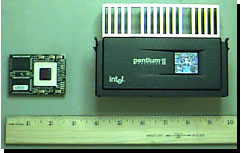
|
simplicity comes from distinguishing between the essential and the inessential --| GOETHE ON PENTIUM/DOS CRUFTINESS |----------------------------------- As you know, "cruft" is the programmer's word for inefficient legacy work-arounds in computer programming. You know--instead of doing it right in the first place, you make another subroutine to work around the original problem in order to postpone a needed rewrite. After reading this recently, I could not help noticing that this could easily be applied today if you substituted "chip architecture" for "theory of colours". It provides an amusing anecdote in relation to the legacy design decisions of the Pentium's CISC architecture versus the new RISC architectures of the Alpha, PowerPC, and MIPS chips. For those of you unfamiliar with literature--Goethe was the German equivalent of Shakespeare; producing a vast output of literature, including the infamous "Faust", and several volumes of scientific works.  GOETHE ON CRUFT (1840) We compare the Newtonian theory of colours to an old castle, which was at first constructed by its architect with youthful precipitation; it was, however, gradually enlarged and equipped by him according to the exigencies of time and circumstances, and moreover was still further fortified and secured in consequence of feuds and hostile demonstrations. The same system was pursued by his successors and heirs: their increased wants within, the harassing vigilance of their opponents without, and various accidents compelled them in some places to build near, in others in conexion with the fabric, and thus to extend the original plan. It became necessary to connect all these incongruous parts and additions by the strangest galleries, halls, and passages. All damages, whether inflicted by the hand of the enemy or the power of time, were quickly made good. As occasion required, they deepened the moats, raised the walls, and took care there should be no lack of towers, battlements, and embrasures. This care and these exertions gave rise to a prejudice in favour of the great importance of the fortress, and still upheld that prejudice, although the arts of building and fortification were by this time very much advanced, and people had learnt to construct much better dwellings and defences in other cases. But the old castle was chiefly held in honour because it had never been taken, because it had repulsed so many assaults, had baffled so many hostile operations, and had always preserved its virgin renown. This renown, this influence lasts even now: it occurs to no one that the old castle is become uninhabitable. Its great duration, its costly construction, are still constantly spoken of. Pilgrims wend their way to it; hasty sketches of it are shown in all schools, and it is thus recommended to the reverence of susceptible youth. Meanwhile, the building itself is already abandonded; its only inmates are a few invalids, who in simple seriousness imagine that they are prepared for war. Thus there is no question here respecting a tedious siege or a doubtful war; so far from it we find this eighth wonder of the world already nodding to its fall as a deserted piece of antiquity, and begin at once, without further ceremony, to dismantle it from gable and roof downwards; that the sun may at last shine into the old nests of rats and owls, and exhibit to the eye of the wondering traveller that labyrinthine, incongruous style of building, with its scanty, make-shift contrivances, the result of accident and emergency, its intentional artifice and clumsy repairs. Such an inspection will, however, only be possible when wall after wall, arch after arch, is demolished, the rubbish being at once cleared away as well as it can be. To effect this, and to level the site where it is possible to do so, to arrange the materials thus acquired, so that they can be hereafter again be employed for a new building, is the ardous duty we have undertaken... (Goethe, Theory of Colours, Preface to the First Edition, 1840) --| References |--- MacKiDo.com - What is RISC? http://www.MacKiDo.com/Hardware/WhatIsRISC.html |

SUBMIT AN ARTICLE posted: june 22, 1999